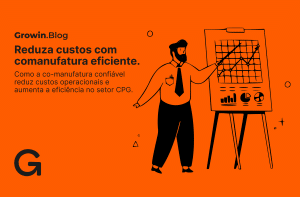In 2023, Unilever announced that its recyclable packaging initiative had reduced operating costs by 10%, while increasing consumer loyalty in emerging markets. In the same year, Nestlé saved millions by redesigning its supply chain to minimize waste. These figures are no coincidence – companies that integrate sustainability into their operations are gaining efficiency and competitive advantage.
There are several reasons why sustainability is an initiative chosen by the big players in the consumer packaged goods market, such as ESG practices, market trends or alignment with consumer habits. From multinationals to medium-sized companies, more and more players in the consumer packaged goods (CPG) sector are discovering that sustainability isn’t just a response to environmental pressures – it’s a real economic and growth strategy.
Sustainability in the consumer packaged goods sector: economy and competitiveness
The consumer packaged goods (CPG) sector faces growing challenges with volatile raw material prices, stricter environmental regulations and changes in consumer behavior. The good news? Sustainability could be the way out to create new profit opportunities.
1. Recyclable packaging: less logistics costs and more sustainability
Danone implemented recyclable materials in its packaging and reduced its logistics costs by 12%. This is because lighter packaging reduces the weight of transported loads, reducing fuel consumption and freight costs. Medium-sized companies that adopted similar solutions reported operational savings in the first six months.
2. Efficiency in the production chain: less waste, more savings
M. Dias Branco, one of Brazil’s largest food manufacturers, has found a way to reduce costs without compromising quality. The company replaced part of the virgin plastic with recycled materials in its packaging and optimized processes to reduce waste in production. As a result, in addition to a significant reduction in raw material costs, the company has also made logistical gains, since lighter packaging reduces transportation costs.
The logic is simple: less waste means lower input and disposal costs. Medium-sized companies that adopt similar strategies report operational savings in the first few months, showing that sustainability and profitability go hand in hand.
3. The consumer has changed: how to adapt your brand to the new sustainable demand
According to NielsenIQ, 68% of consumers in Latin America prefer sustainable brands, and Simon-Kucher & Partners revealed that 34% are willing to pay more for products with a lower environmental impact.
Furthermore, an analysis by McKinsey & Company showed that, globally, products with sustainable claims are growing twice as fast as conventional ones. This means that companies that adopt sustainability practices in the consumer packaged goods market not only win new customers, but also strengthen the loyalty of existing consumers – and can even charge a premium price for doing so.
Why sustainability has become essential in the CPG market
If a few years ago sustainability was seen as a competitive differentiator, today it has become a requirement for staying in business. Governments are implementing stricter legislation on the use of plastics and companies’ responsibility for waste management. In Brazil, the National Solid Waste Policy (PNRS) already requires brands to take responsibility for the life cycle of their packaging, and global trends indicate that this type of regulation will only intensify. At the same time, large retailers such as Carrefour and Walmart are demanding more sustainable packaging and production chains with less environmental impact from their suppliers. For many companies, adapting to these new demands is no longer a choice but a matter of commercial success.
At the same time, the end consumer is also more attentive and demanding. A study by First Insight & Wharton School showed that 75% of Generation Z considers sustainability when making purchasing decisions, while 40% of Latin American consumers have already stopped consuming brands they consider harmful to the environment. This new reality is accelerating trends such as eco-design, which reduces the use of raw materials without compromising the functionality of the packaging, and the development of intelligent packaging, which facilitates recycling and guarantees more transparency about the origin of products. In a market that is increasingly regulated and driven by the demand for environmental responsibility, companies that are ahead in adopting these solutions will have a clear competitive advantage in the coming years.
Affordable solutions to make your business more sustainable
The transition to sustainable solutions doesn’t have to be complex or expensive. With the right partnership, your company can optimize costs while meeting new market requirements.
At GrowinCo., we connect you with manufacturers who offer sustainable packaging solutions aligned with your needs, ensuring efficiency and competitiveness. Whether it’s reducing waste, optimizing logistics costs or making your product more attractive to the end consumer, we help your brand grow intelligently.
🔍 Want to find out how to reduce costs and make your brand more sustainable?
Contact us and find out about the best solutions for your business.




